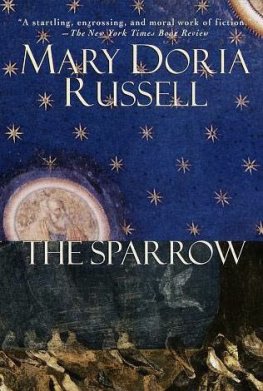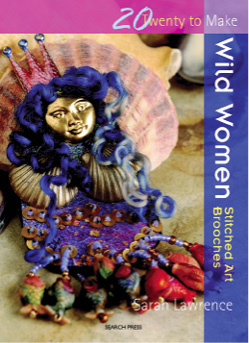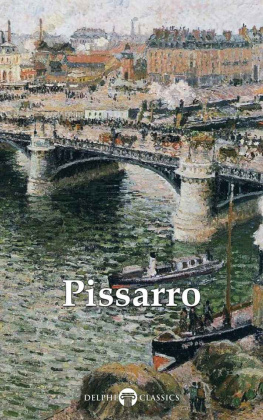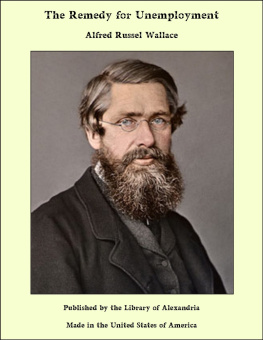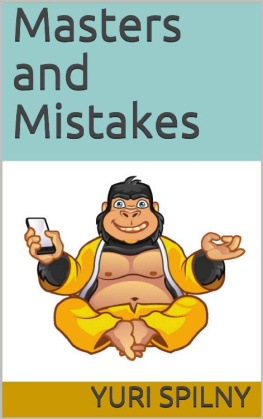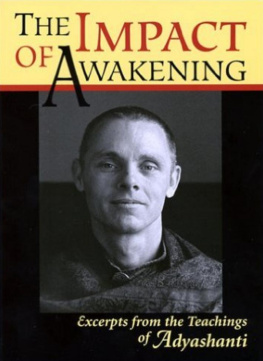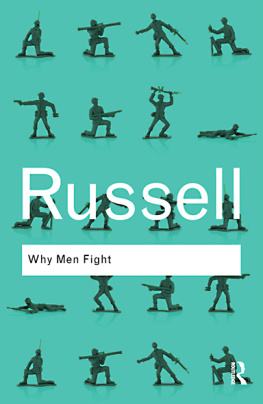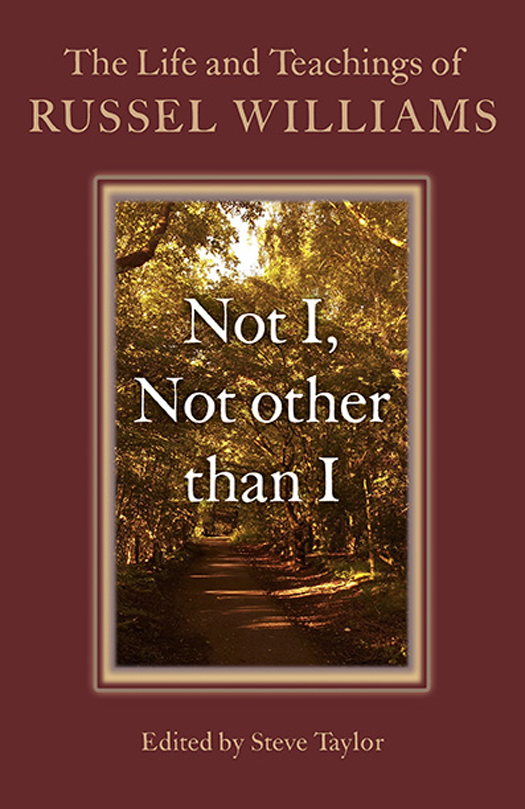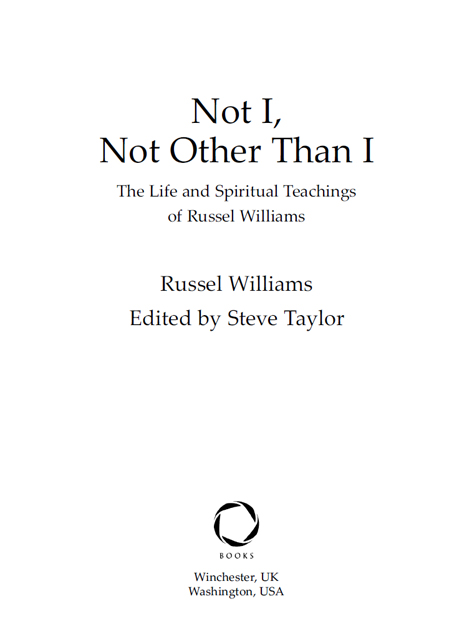WHAT PEOPLE ARE SAYING ABOUT
NOT I, NOT OTHER THAN I
For over half a century Russel Williams has been an utterly authentic voice of the Buddha dharma and spiritual friend to many. His goodness and wisdom shine through the pages of this book.
Lama Jampa Thaye, scholar, author, meditation master, founder of the Dechen International Association of Sakya and Karma Kagyu Tibetan Buddhist Centres
One of the most remarkable and powerful spiritual teachers of our time, who has been happy to remain almost unknown for several decades, sharing his wisdom and his presence to small groups of people, quietly changing many lives. With this book, Russels profound teachings reach out to the wider world for the first time.
Steve Taylor, author of The Fall, Waking From Sleep and The Calm Center
There are a few who manage realisation easily, through some fluke, or perhaps through the work of past lives. We should draw near to them and listen carefully to what they have to say, to be inspired by their example, and for the constant reminder of the simplicity of our path. This eloquent book of Russel Williams words of wisdom provides that inspiration beautifully.
Nick Scott, meditation teacher, co-author of Rude Awakenings and The Long Road North
May these words from the heart touch the hearts of those who read them and give them confidence and inspiration in the practice that leads to awakening to deeper Truths.
Karuniko Bhikkhu, Chithurst Buddhist Monastery
First published by O-Books, 2015
O-Books is an imprint of John Hunt Publishing Ltd., Laurel House, Station Approach,
Alresford, Hants, SO24 9JH, UK
www.johnhuntpublishing.com
For distributor details and how to order please visit the Ordering section on our website.
Text copyright: Russel Williams 2014
ISBN: 978 1 78279 729 6
Library of Congress Control Number: 2014954851
All rights reserved. Except for brief quotations in critical articles or reviews, no part of this book may be reproduced in any manner without prior written permission from the publishers.
The rights of Russel Williams as author have been asserted in accordance with the Copyright, Designs and Patents Act 1988.
A CIP catalogue record for this book is available from the British Library.
Design: Stuart Davies
Printed and bound by CPI Group (UK) Ltd, Croydon, CR0 4YY, UK
We operate a distinctive and ethical publishing philosophy in all areas of our business, from our global network of authors to production and worldwide distribution.
Introduction
by Steve Taylor
Russel Williams is a simple man. On the surface, you would think of him as a fairly typical man of his generation, although perhaps one who looks unusually young and sprightly for his 93 years. If you visited him at home with his wife Joyce, you wouldnt find anything unusual there either. Again, it would strike you as a fairly typical house for a couple of their senior years.
Russel is not educated he left school at the age of 11 (in 1932) and has had no formal education since. Hes not an intellectual; he hasnt read a great many books, and in his teachings he rarely refers to texts or other sources. Although he has been the president of the Buddhist Society of Manchester since 1974, and sometimes uses Buddhist terms or talks about the Buddha as an individual, he doesnt consider himself a Buddhist. He certainly doesnt teach Buddhism in any formal sense.
As a result, Russels spiritual teachings are very naked and pure that is, they are very free of theories, concepts and categories. This gives his teachings a rare clarity and power. There is no system. There are no rituals or rules to follow, no ideas to take on board. You dont have to believe anything. You dont have to accept anything. You dont have to become anything. All you have to do is be.
Russel often says that hes not interested in convincing people of anything. He encourages people to play with his teachings, to question them, to find out for themselves whether they are true. He doesnt think of himself as a guru, and has no desire to accumulate followers or disciples. Everything he teaches stems very directly from a particular state of being, one which he experiences as his constant reality, and which he has done for almost 65 years. There are many different terms for this state: stillness, pure consciousness, emptiness of being, the essence of our being, our true nature
Russel teaches us how to uncover this state how we can nurture it, and remove some of the obstacles which stop its expression. He makes it clear that this is our natural state, and that its only due to confusion that we have lost access to it. He helps us to remove the confusion, to disentangle our minds from the mess of concepts and thinking habits which cloud them, so that we can become who we really are.
In this state, we are naturally one with everything, and with the universe itself. We are part of the Unmanifest. We are part of the pure consciousness which has given rise to the whole universe. That consciousness is our true nature, and when we rest within it, we feel a powerful sense of ease and contentment.
Since the late 1950s, Russel has held regular talks at the premises of the Buddhist Society of Manchester. Initially these were held almost every evening, but over the last few decades, they have taken place twice a week, on Monday and Wednesday evenings. Apart from missing the occasional week due to ill health, the meetings continue from year to year, unbroken. They are free of charge on principle, Russel has never made any money from his spiritual teachings. The meetings are also completely open anyone is free to come, and no one has ever been turned away.
Russel has never promoted or publicised himself. You wont find any of his talks advertised on the Internet or any videos of his on YouTube. Until now, he has never published any writings. He has always believed that he can be most effective working with small groups, helping to bring about change by intensively engaging with individuals.
I first suggested the idea of him writing a book several years ago. He was initially dismissive, saying that his teachings were most effective on a feeling level, and that this could never be captured in writing. He was happy to let me interview him and tell his story in my book Out of the Darkness, but said he had no desire to publish a book of his own. For a long time, I encouraged him to record the twice-weekly meetings, so that they could be transcribed and perhaps eventually published, but again, he was not enthusiastic.
However, about three years ago I learned that Russel was now open to the idea of writing and publishing a book. Nearing the age of 90, he was aware that it might not be too long before he departed this Earth, and felt that it might be helpful to leave a record of his teachings. As a result, we began to record some of the meetings.
Knowing that Russels early life was filled with many tragic and dramatic events, I was keen for the book to be partly an autobiography. Even from a purely historical point of view, his life story is fascinating: the terrible hardship of his life during the 1920s and 30s (particularly after being orphaned by the age of 11), his experiences at Dunkirk and during the Blitz, and his wanderings after the war. This leads to the story of his sudden spiritual awakening one of the most amazing examples of transformation through suffering I have come across.


